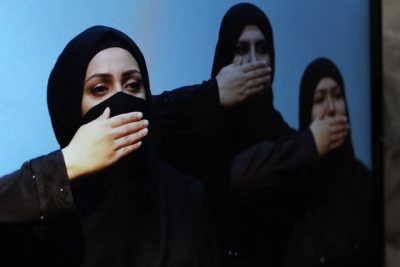The world remembers the ancient Greek Gods and legendary Trojan Horse, but many forget the decade-long war in between.

Much more recently, the civil war in Syria made national headlines since the Arab Spring in 2011, but the continued struggle and stories of refugees who are affected by these conflicts can often be overlooked.
The College of Arts and Sciences Core Curriculum and Arvind and Chandan Nandlal Kilachand Honors College joined forces to screen the movie “Queens of Syria” March 2 over Zoom and host a follow-up Q&A session Thursday with the filmmakers.
The documentary, released in 2014, follows more than fifty female Syrian refugees who flee to Jordan and create their own version of “The Trojan Women” in 2013 — an ancient Greek tragedy written by Euripides depicting the heartbreak, anger and grief of women in the aftermath of the Trojan War.
Kyna Hamill, the director of the Core Curriculum, helped organize the event. She said she is teaching a digital media and expression course that is a deep dive into Euripides’ Hecuba from around 424 B.C. — an adaptation of the story of The Trojan Women.
The Trojan Women, an anti-war tragedy written in 415 B.C., was originally presented to an audience during the Peloponnesian War, Hamill said, and the documentary features Syrian refugees performing the play as the conflict in their country raged on.
The documentary follows the process of putting the show together, but also gives a glimpse into the lives of some of the performers during rehearsals.
Hamill said the play and the historical context around it gives it a power that makes it impactful centuries later.
“It was such a wonderful selection for the production team to choose this play to identify that there is trauma … the women and the children especially suffer at it,” Hamill said. “It’s a moment to really speak about how older texts can really contribute to the conversations about war and about what’s happening right now.”
Given the connections to the course material in their respective departments, Hamill said this film would provide a valuable experience for her students.
“It speaks to the past, it speaks to the present,” she said. “It was just something great that I wanted to bring on campus.”
The documentary weaves the women’s stories throughout the timeline of the play, as the women see themselves and their journeys reflected in the play’s characters.
Carrie Preston, the director of Kilachand Honors College and a professor of english who helped organize the event, said she hopes students from the Kilachand Honors College gain a better understanding of the history behind the refugee crisis through this documentary.
“Most people, if not all people, who have been forcibly displaced are survivors of really extreme trauma,” Preston said. “There’s a long history of using art as therapy and to support healing.”
Preston said she is personally working on “theatrical responses to forced displacement.”
Hamill also said at first glance, the plays seem old, but remains applicable to modern-day learners.
“They’re what seem like kind of dusty old plays,” Hamill said, “but I think if there’s anything that’s very true about the Greek tragedies, [it’s] that they’re always speaking to the present moment.”
Preston said she hopes the stories in the documentary inspire viewers to educate themselves further on the Syrian civil war and other similar conflicts.
“I hope that students will leave the production and the panel and want to educate themselves about what I consider the global crisis of forced displacement,” she said, “and to think about how they can help, think about how they can support refugees.”
She added that the art can potentially help students imagine a “different future” where displacement, suffering and war are not inevitable and work to make that possible. At the same time, she said she hopes the film shows that these survivors are strong.
“Although people may be survivors of war and suffering from forced displacement, there is tremendous creativity and resilience amongst these people,” Preston said. “I think gives a very different picture of those who have experienced forcible displacement, and it’s a really important one to set alongside those images of victims.”


























































































































